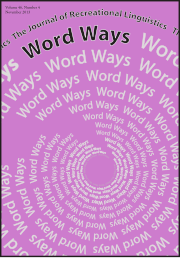 Cover of the November 2013 issue | |
| Editor | Jeremiah Farrell |
|---|---|
| Categories | Recreational linguistics |
| Frequency | Quarterly |
| Publisher |
|
| First issue | 1968 |
| Country | USA |
| Based in | Indianapolis, Indiana |
| Website | digitalcommons |
| ISSN | 0043-7980 |
| OCLC | 1604435 |
Word Ways: The Journal of Recreational Linguistics is a quarterly magazine on recreational linguistics, logology and word play. It was established by Dmitri Borgmann in 1968 at the behest of Martin Gardner. [1] [2] [3] [4] Howard Bergerson took over as editor-in-chief for 1969, but stepped down when Greenwood Periodicals dropped the publication. [1] [3] [5] A. Ross Eckler Jr., a statistician at Bell Labs, became editor until 2006, [3] [5] when he was succeeded by Jeremiah Farrell (Butler University). [6]
Contents
Word Ways was the first periodical devoted exclusively to word play, and has become the foremost publication in that field. [3] [7] Lying "on the midpoint of a spectrum from popular magazine to scholarly journal", [5] it publishes articles on various linguistic oddities and creative use of language. This includes research into and demonstrations of anagrams, pangrams, lipograms, tautonyms, univocalics, word ladders, palindromes [8] and unusually long words, [4] [5] [9] [10] [11] as well as book reviews, literature surveys, investigations into questionable logological claims, puzzles and quizzes, mnemonics [12] and a small measure of linguistically oriented fiction. [5] [13]
Willard R. Espy discovered Word Ways in 1972, and eventually used material from several dozen articles in his Almanac of Words at Play anthologies. [9] [14] [15] [16] The first of these included complete subscription details for Word Ways, which generated so many inquiries that for decades the publishers were reluctant to change their address. [17]
In the November 2020 issue, editor Jeremiah Farrell announced that the publication of Word Ways would be suspended, but will hopefully resume in the future. [18]